06 May 2021, 22:28

By the end of 2020, the East Kazakhstan region demonstrates a positive dynamics of growth of the main indicators of socio-economic development. Thus, the short-term economic indicator for the region for January-December 2020 amounted to 100.9%.
The volume of industrial production increased by 101.5%, manufacturing - 101.0%, agriculture - 102.6%, investments - 112.0%, construction works - 126.8%. About 519.8 thousand sq. m. of housing were commissioned, with an increase of 117.4%. The number of operating small and medium-sized businesses amounted to 90.5 thousand with an increase of 101.7%.
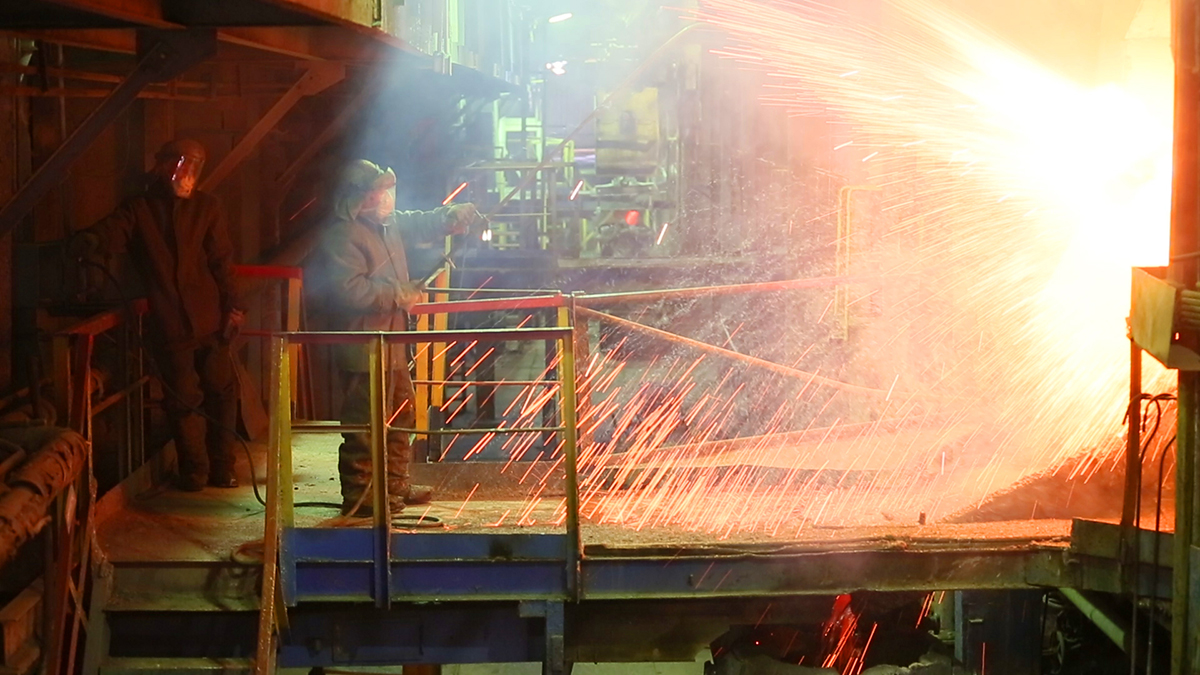
The positive results in the real sector were reflected in the indicators of the social sphere. Cash incomes of the population increased by 11.3%, average monthly wages - by 18.3%, deposits of individuals - by 11.4%.
Measures to restore economic activity
To mitigate the consequences of external challenges in the East Kazakhstan region, anti-crisis measures have been taken to support small and medium-sized businesses, the agro-industrial complex, develop infrastructure, provide employment, as well as prevent a decrease in the population's income:
- under Aq-Niet program of concessional financing, industry restrictions were abolished and lending to retail traders was included, the maximum loan amount was 50 million tenge;
- additional 800 million tenge was directed to replenish the regional stabilization fund;
- 63.5 thousand tons of diesel fuel at the average market price of the Pavlodar petrochemical plant were allocated to the agricultural formations of the region for carrying out spring field and harvesting work, including 30.5 thousand tons for spring field work, 26 thousand tons for harvesting work , for drying - 7 thousand tons. For field work, loans were issued in the amount of 3.9 billion tenge (through Agrarian Credit Corporation JSC);
- 77.4 billion tenge was allocated for the implementation of 819 projects of the region, more than 22 thousand jobs were created to ensure employment and solve topical issues of infrastructure development within the framework of the Employment Roadmap.
In addition, state support for small and medium-sized businesses is carried out within the framework of Business Road Map-2025 program and the Enbek Program for Development of Productive Employment and Mass Entrepreneurship.
In 2020, subsidy agreements were signed for 1,049 projects for a total amount of loans of 27.2 billion tenge, subsidies for 1.6 billion tenge were paid. 468 projects were guaranteed for 13.7 billion tenge, the amount of guarantees amounted to 5.6 million tenge. 106 grants were provided for 517.0 million tenge.
As part of the implementation of the second direction of Enbek State Program on microcrediting in cities and single-industry towns in 2020, 137 projects were credited for 1.3 billion tenge.
The most affected industries in the region during the pandemic are transport, trade and services.
At the same time, the epidemiological situation gave impetus to the development of light industry (production of personal protective equipment), delivery of goods, food, medicines.
In addition, digital technologies are being rapidly introduced in the region.
There is an Interdepartmental Single Situation Center for Digitalization, which provides an integrated, unified approach to the interaction of information systems for road safety, transport, social facilities, emergency and utilities services, geographic information systems.
Thanks to this, the response time to the population's requests has been reduced, and the confidence of citizens has increased.
Social support of citizens during the quarantine period
In 2020, targeted social assistance was assigned to 10,969 families (52,681 people, including 31,821 children) for a total amount of 4.7 billion tenge, (including 3,689 large families (23,393 people, including 17,768 children).
State social assistance was provided to 12,135 children aged 1-6 years (these kits were provided by 24 providers).
In 2020, citizens were provided with free protective masks in the amount of 470 thousand people for 160.0 million tenge.
From March-May and July-August, food and household sets of 5,567 tenge were provided to 79,716 citizens (children from 6-18 years old, receiving TSA; disabled persons of groups 1, 2 and 3; disabled children under 16; persons raising a disabled child; unemployed registered in employment centers) at the expense of the republican budget in the amount of 1,735 million tenge.
According to data from the regional branch of Government for Citizens State Corporation, in the East Kazakhstan region a social payment of 42,500 tenge was received by 452,359 people for a total amount of 30.7 billion tenge, including in a proactive mode, of which during the emergency period - 296,485 people, 20.8 billion tenge, during the period of restrictive measures - 155,874 people, 9.9 billion tenge.
From the second quarter of 2020, the assignment of targeted social assistance was carried out automatically in connection with the pandemic, in order to prevent the spread of CVI among the target audience, i.e. prolongation was carried out.
To date, the TSA has been assigned to 7,151 families (34,663 people, including 13,219 children) for a total amount of 357.4 million tenge, (including 1,380 large families (8,933 people, incl. 6 372 children).
State Social Support was provided to 8,651 children aged 1-6.
Results of development of the region's industry in 2020
In 2020, industrial products were produced by 2,539.1 billion tenge, which is 385 more than the level of 2019, 4 billion tenge (2019 - 2,153.7 billion tenge), IFO - 101.5%.
The main growth in industrial production was provided by an increase in the production of gold concentrates by 19.3%, refined gold by 27.7%, passenger cars by 7.2%.
In the mining industry, production amounted to 596.8 billion tenge, the growth rate was 124.0% (IFO - 103.2%).
The volume of production of the manufacturing industry for 12 months of 2020 amounted to 1822.9 billion tenge with a growth rate of 116.8%, IFO - 101% (12 months of 2019 - 1,560.2 billion tenge).
Growth in the processing industry was ensured by growth in production of metallurgy.
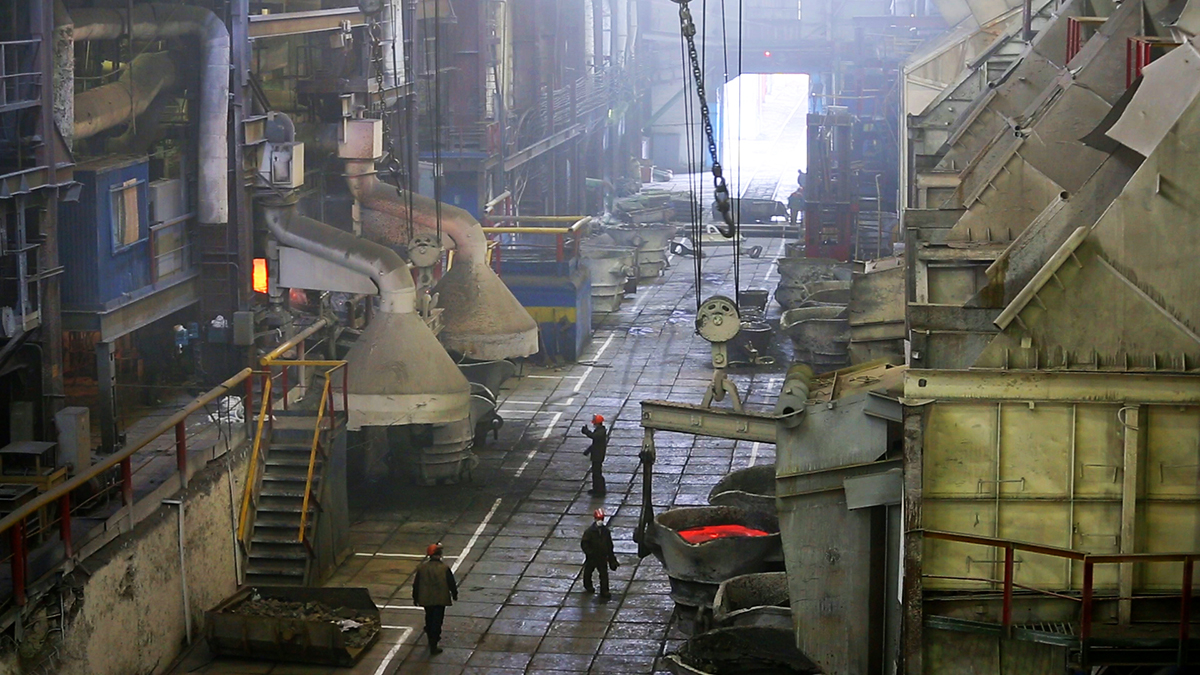
The enterprises of the metallurgical industry produced products in January-December 2020 in the amount of 1,273.9 billion tenge, the growth rate was 122.3% (IFO - 101.2%).
In addition, there is growth:
- in mechanical engineering (IFO - 111.0%), which occurred due to an increase in the production of cars, trailers and semi-trailers (IFO - 115.7%);
- in the production of woodworking products (IFO - 123.0%); - in the production of rubber and plastic products (IFO - 112.7%);
- in the pharmaceutical industry (IFO-105.2%);
- in the production of other non-metallic mineral products (IFO - 103.2%).
Results of development of agriculture in the region in 2020
At the end of 2020, the gross agricultural output amounted to 686.3 billion tenge, or 116% of the indicator of 2019. The IFO of the gross agricultural output was 102.6%.
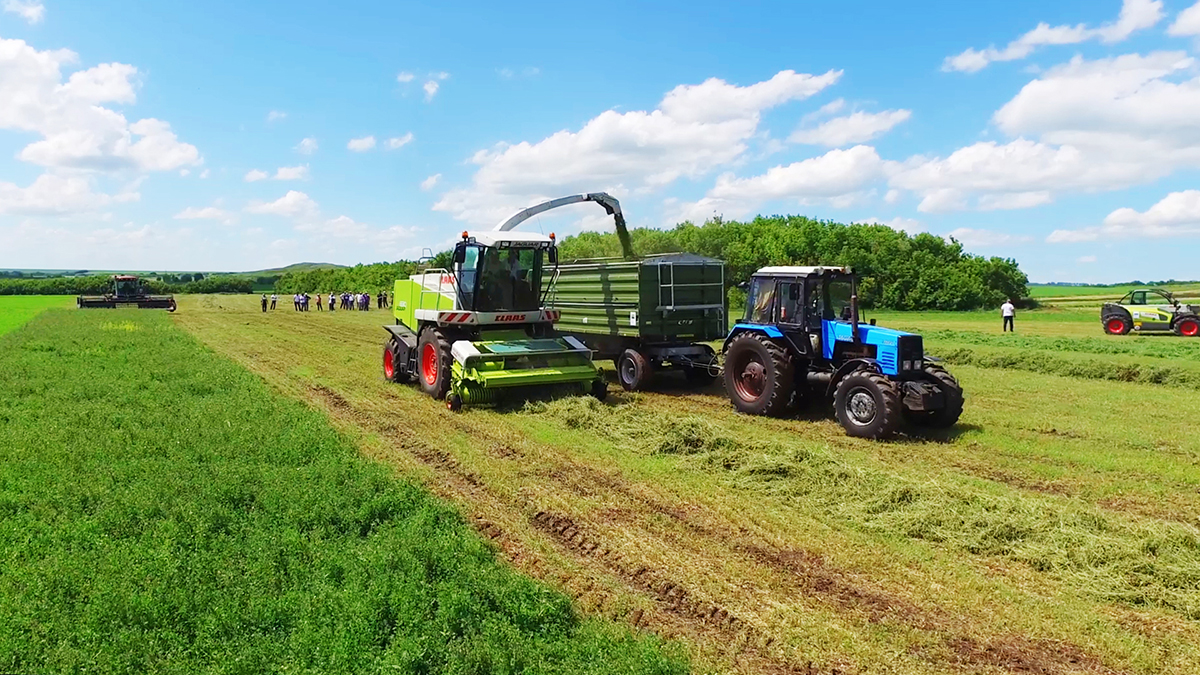
Investment in fixed assets in agriculture reached 36.9 billion tenge, or 121.5% to the level of 2019.
Food production amounted to 148.8 billion tenge, or 107% to the level of 2019, IFO - 92.4%.
Investments in food production amounted to 10.7 billion tenge, or 191.4% by 2019.
In 2020, 30.2 billion tenge of subsidies were allocated to support the development of the agro-industrial complex of the region.
In 2020, the sown areas amounted to 1,367.4 thousand hectares, or 100.5% of the level of 2019. In the structure of sown areas, cereals and legumes occupied 44%, oilseeds - 33%, fodder - 20.5%, vegetables - 0 , 6% and potatoes - 1.4%.
At the end of the year, the gross harvest of cereals amounted to 773.9 thousand tons (83.2% of the level of 2019), oilseeds - 615.7 thousand tons (103.2%), vegetables - 256.0 thousand tons (108 , 6%) and potatoes - 435.8 thousand tons (102.5%).
The average yield of cereals was 13 c / ha (in 2019 - 17 c / ha), oilseeds - 13.8 c / ha (in 2019 - 12.5 c / ha), potatoes - 225.7 c / ha (in 2019 - 217.8 c / ha) and vegetables - 294.3 c / ha (in 2019 - 283.3 c / ha).
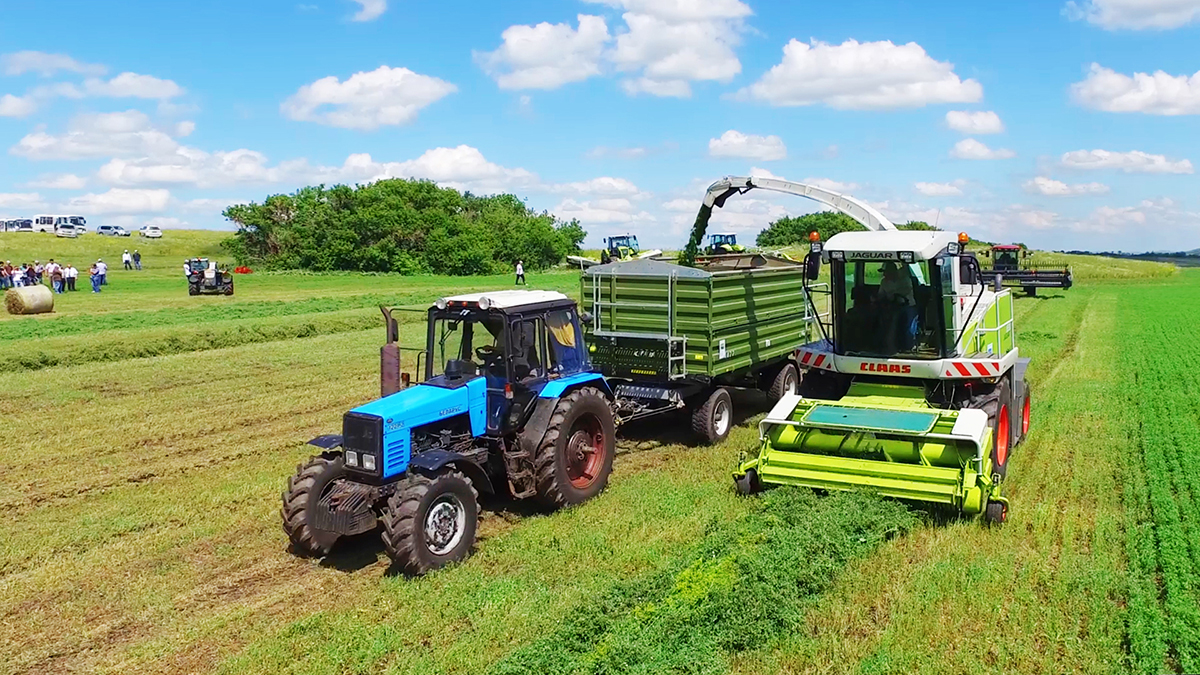
In 2020, the production of all types of meat in live weight reached 299.4 thousand tons, or 103.7% to the level of 2019, milk - 988.9 thousand tons (103.9%), eggs - 155 million pieces. (101.5%).
The number of cattle increased by 4.9%, horses - by 8.1%, pigs - by 2.4%, the number of sheep and goats remained at the level of last year - 100.5%.
In the past year, 4 dairy farms were built in the region with a total capacity of 1050 cattle stalls. 3 farms for 150 heads were reconstructed.
Five milk collection points have been established.
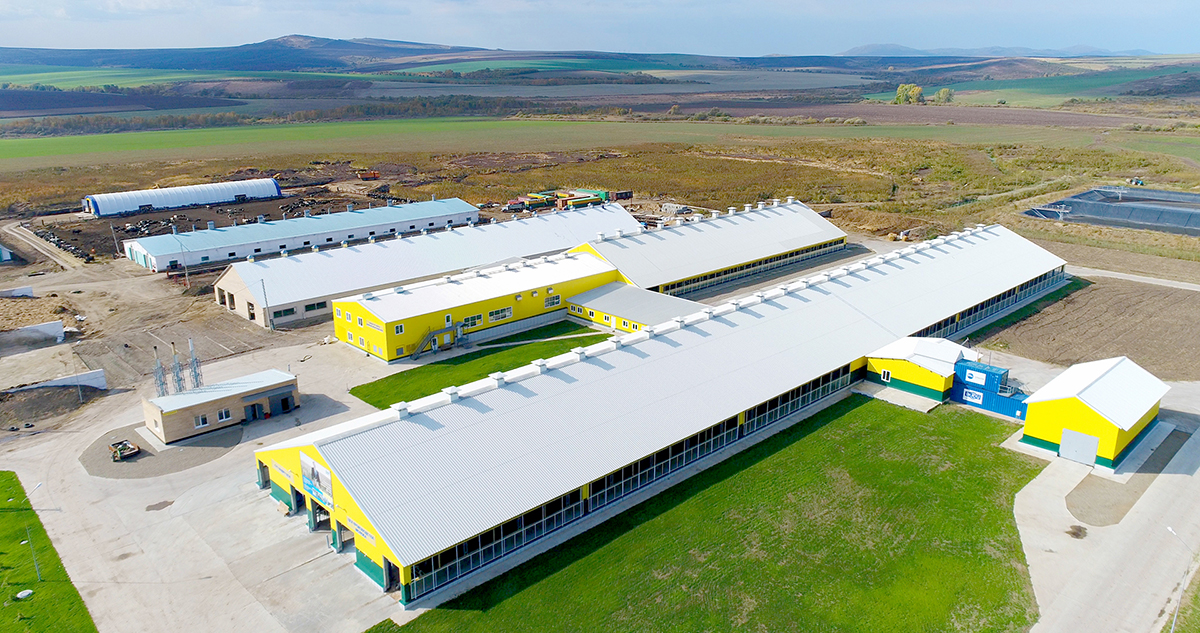
57.2 thousand tons of milk have been purchased from the population, dairy farms sold 100.2 thousand tons of milk.
The workload of milk processing enterprises was 87%.
Three feedlots were built with a one-time maintenance of 7000 heads. One industrial-type site for 5,000 heads.
Implementation of the Economy of Simple Things program
According to the regional project office, the Chamber of Entrepreneurs Atameken in the East Kazakhstan region, to date, within the framework of the Economy of Simple Things program, 250 projects worth 43.477 billion tenge have been approved by financial institutions.
Of the approved projects, second-tier banks and the Agrarian Credit Corporation for 242 projects issued financial resources to entrepreneurs in the amount of 42.6 billion tenge.
In 2020, JSC Damu Fund approved the project of LLP Altyn Shyghys for 22 billion tenge.
Also, 5 large projects were approved for a total amount of 10.8 billion tenge: Ust-Kamenogorsk Flour Mill LLP, ArnaMinerals IP, Priirtyshskaya Broiler Poultry Farm LLP, May JSC, Ust-Kamenogorsk POULTRY FACTORY JSC.
Attracting investments
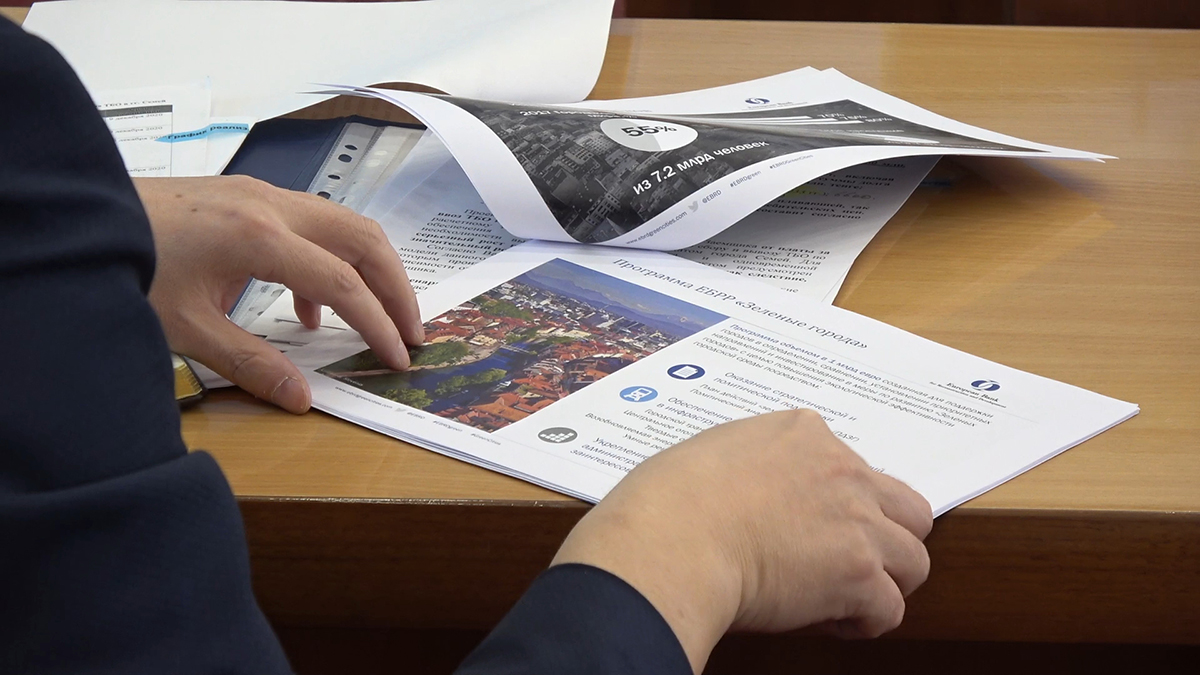
The volume of investments in fixed assets in 2020 amounted to 714.5 billion tenge, IFO - 112.0%. The specific weight of the region in the republican volume of investments is 5.8%.
In the structure of investments by sources of financing, own funds of enterprises accounted for 65.4%, the republican budget - 7.9%, the local budget - 15.5%, bank loans - 1.5%, other borrowed funds - 9.7%.
Investment volumes by spheres:
In order to create conditions for further attracting investments in the region, the Investor Service Sector and the Entrepreneurship Service Center operate on the principle of one window, and an investment portal is operating.
The East Kazakhstan region investment center was opened, which made it possible to create conditions for point support of each investment project and investor. When the investor contacts the investment center, the work of the responsible state bodies and organizations is promptly organized to provide services (obtaining technical specifications and other permits, consultation on government support measures and investment preferences, obtaining land plots, etc.).
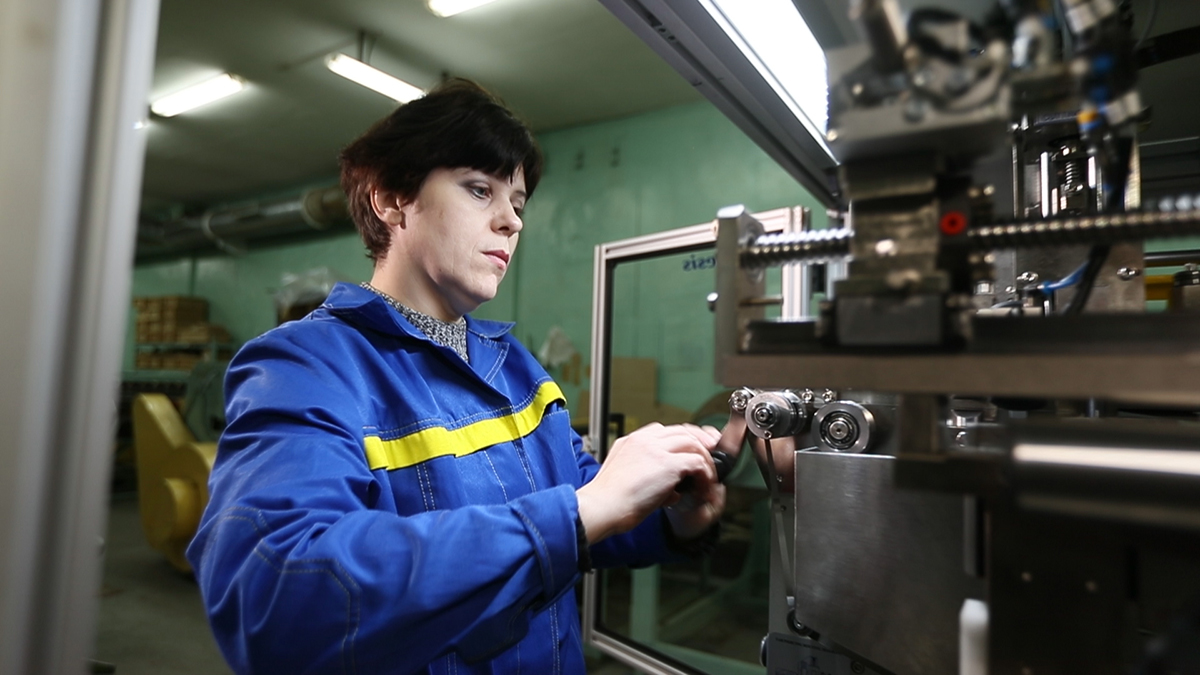
Within the framework of the Entrepreneurship Support Card, 88 investment projects are being implemented for a total amount of 1.4 trillion tenge with the creation of 20.0 thousand jobs. In 2020, 5 projects were implemented for a total amount of 37.5 billion tenge, with the creation of 434 jobs.
For reference:
- LLP GRK MLD - Construction of a mining and processing complex of the Karchiginskoye deposit. The cost is 5.0 billion tenge. Jobs - 200;
Results of SME development in 2020
The number of operating small and medium-sized businesses amounted to 90,453 or 101.7% to the level of 2019 (88,938), 102,949 subjects were registered.
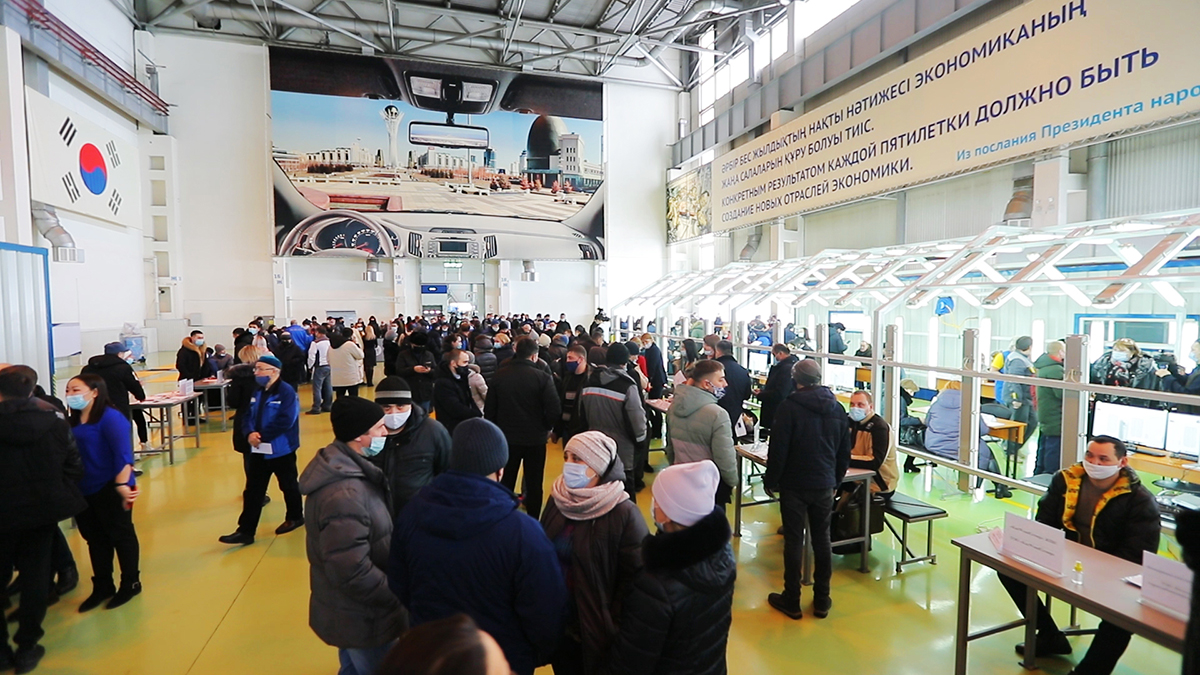
As of Oct. 1, 2020, 230.1 thousand people are employed in small and medium-sized businesses.
In January-September 2020, SMEs produced products for 864.9 billion tenge, with an increase of 9.1 billion tenge or 101.0% compared to the corresponding period of 2019 (855.8 billion tenge).
In 2020, small and medium-sized businesses received 89.6 billion tenge of tax revenues and payments, which is more by 14.1 billion tenge or 18.6% compared to 2019 (75.5 billion tenge).
Within the framework of the Business Road Map-2025 Program, in 2020, subsidy agreements were signed for 1,049 projects worth 27.2 billion tenge in loans, subsidies for 1.6 billion tenge were paid. The guarantees were received by 457 projects for the amount of loans of 13.7 billion tenge. The amount of guarantees amounted to 5.6 billion tenge.
106 grants were provided for 517.0 million tenge.
Implementation of state programs Nurly Zher, 7-20-25, Baspana
By the end of 2020, at the expense of all sources of funding, 519.8 thousand square meters were commissioned, with an increase of 117.4% to the volume of 2019 (the finalized plan is 519.3 thousand m2). Of these:
35 apartment buildings for 233.0 thousand square meters:
- 12 credit houses at the expense of government securities for 96.4 thousand square meters (1,328 apartments);
- 9 non-repurchase rental houses for 39.8 thousand square meters (548 apartments);
- 3 credit houses from the SEC for 30.1 thousand square meters (384 apartments);
- 11 commercial buildings for 66.7 thousand square meters (614 apartments) at the expense of private investors;
- 37 one-storey rental houses in the DKZ for 7.1 thousand square meters (74 apartments);
- 206 one-storey houses for 36.6 thousand square meters (382 apartments) at the expense of private investors, with subsequent purchase for large families;
- 227.4 thousand square meters - individual housing construction at the expense of the population;
- 15.7 thousand square meters - other housing.
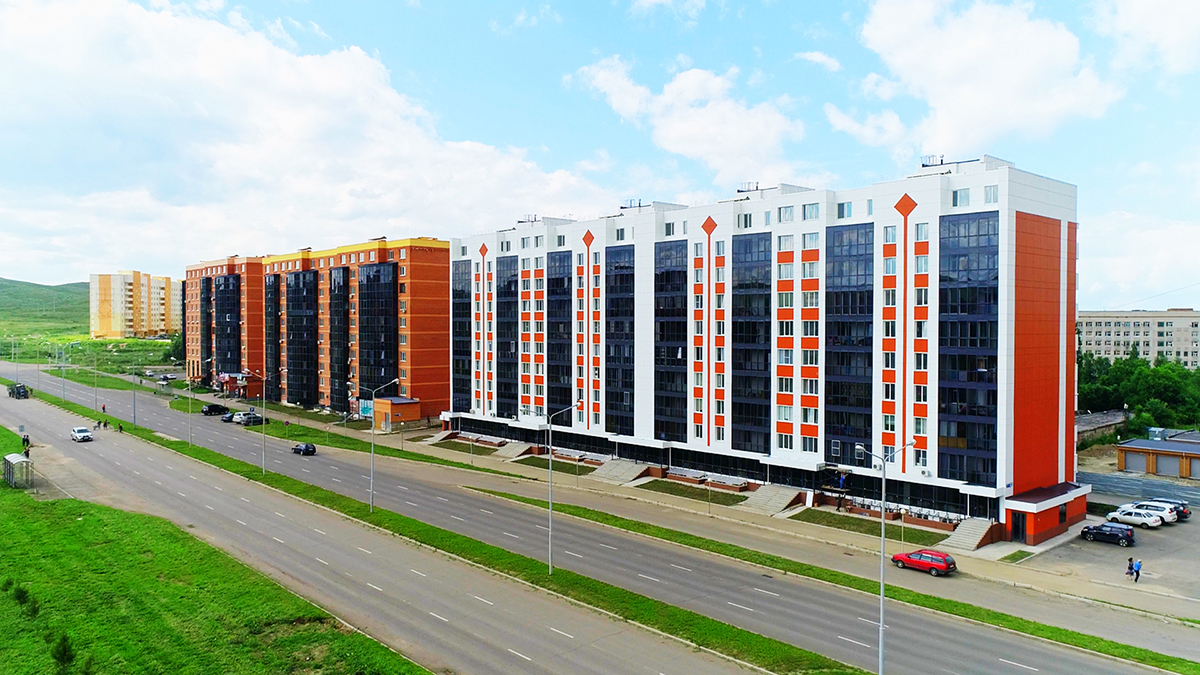
As of Dec. 30, 2020, within the framework of the 7-20-25 program in the region of second-tier banks, 2,045 applications for obtaining mortgage housing loans in the amount of 18.8 billion tenge were accepted, of which 1,345 applications were approved for the amount of 12.4 billion tenge.
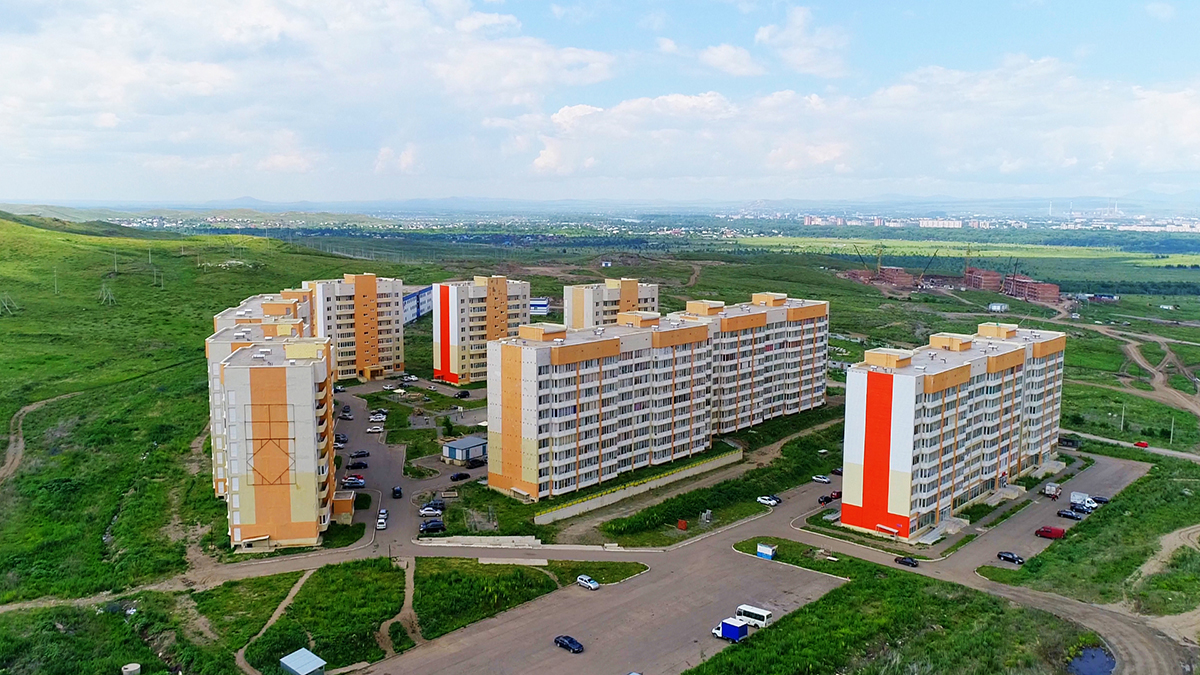
As of Feb. 4, 2021, within the framework of the 7-20-25 program in the region of second-tier banks, 2,176 applications for obtaining mortgage housing loans for the amount of 20.0 billion tenge were accepted, of which 1,444 applications for the amount of 13.4 billion were approved.
Implementation of road projects of Nurly Zhol program
Within the framework of the Nurly Zhol state program, 38.706 billion tenge was allocated for the roads of republican significance in 2020, including:
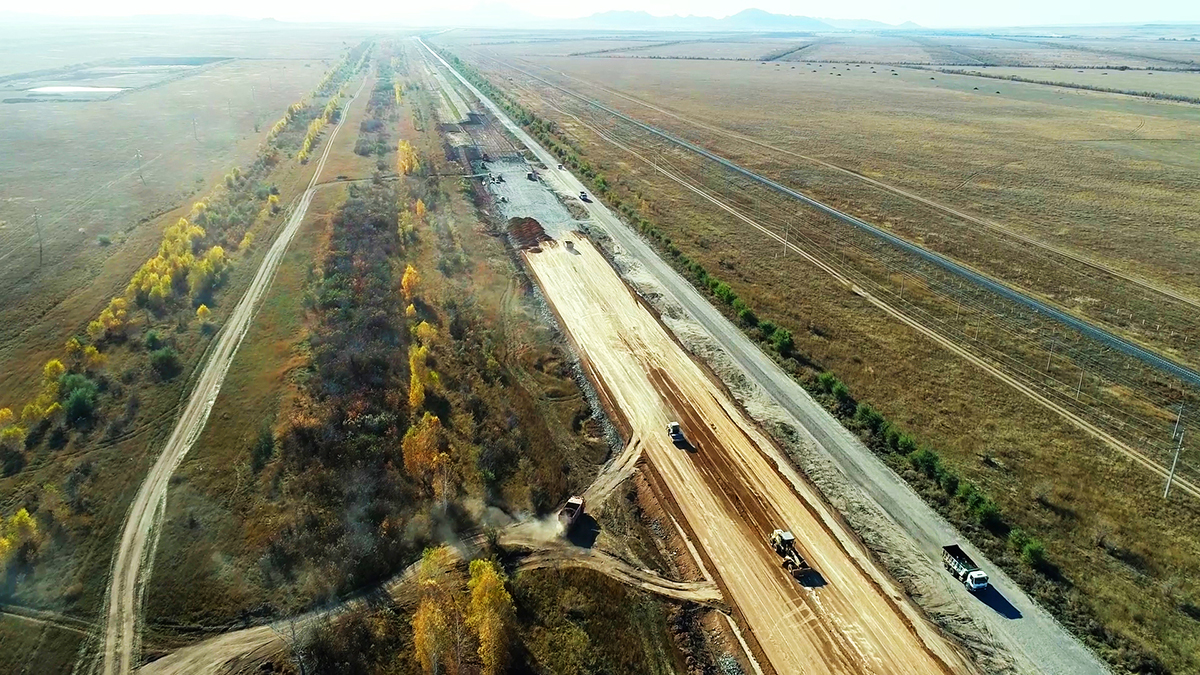
Within the framework of the Nurly Zhol state program in 2021, it is planned to allocate 65.533 billion tenge for the roads of republican significance, including:
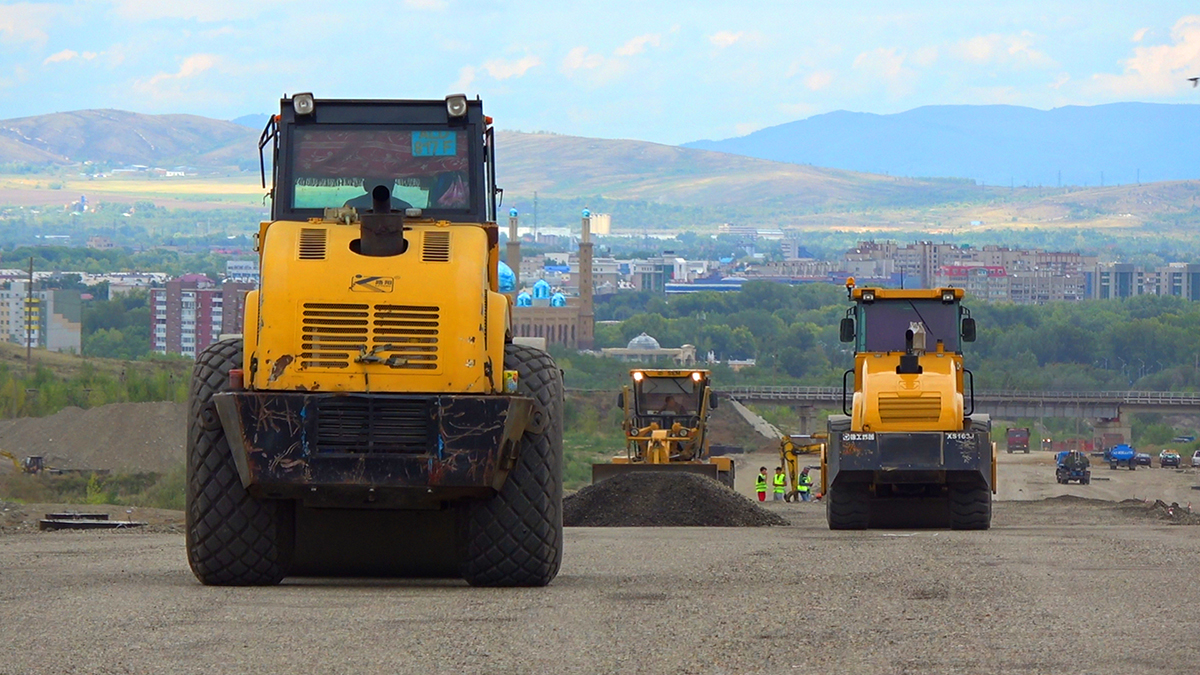
Employment and unemployment in the region in 2020
In 2020, it was planned to create 28,077 new jobs in the region, incl. permanent 13,600. Actually created in various sectors of the economy 29,188 jobs or 104% of the plan, incl. permanent - 13,863 (102%).
38,169 people applied for labor mediation to the employment agencies of the region, of which 29,003 (76.0%) were employed. The number of registered unemployed as of Jan. 1, 2021 was 4,340 people.
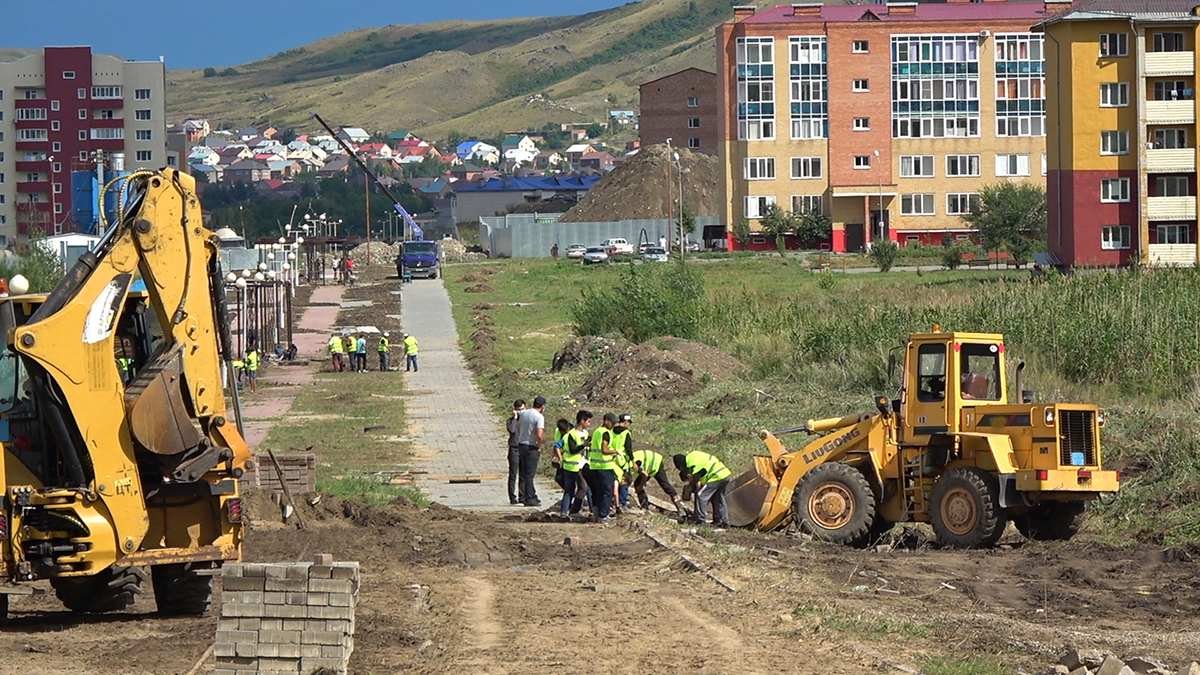
30,813 people became participants in Enbek state program for the development of productive employment and mass entrepreneurship, 19,081 people were employed, of which 12,680 people were employed for permanent jobs.
For the implementation of the Enbek program in 2020, 10.1 billion tenge was allocated from all sources of financing.
In 2020, within the framework of obtaining technical and vocational education, 1,730 students began training (for 2.5 years).
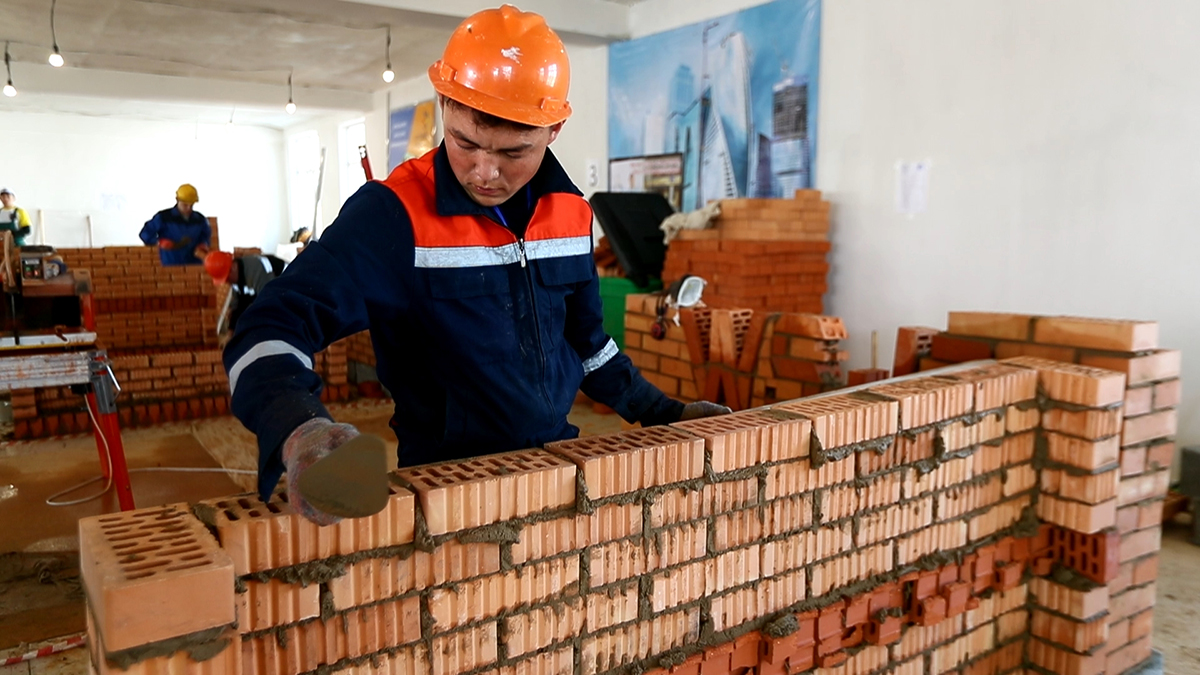
In 2020, 1,335 people were sent to short-term courses. 1,231 people completed their training, 975 people (79.2%) were employed.
The training plan for TVE in 2021 was 1,730 people, for short-term training - 1,485 people.
In 2020, as part of the development of mass entrepreneurship under the Enbek Program:
- 1,964 people were trained in the basics of entrepreneurship;
- 990 microcredits were issued for startups and business expansion for 4.7 billion tenge;
- 1,852 state grants were issued for the implementation of business ideas in the amount of 1,028 million tenge (including 636 - to large families and 239 - to low-income (not large) families).
As part of promoting employment in 2020, more than 10 thousand people were employed at state-subsidized jobs (947 - social jobs, 1 211 - for youth practice, 8565 - public works).
As part of increasing the mobility of labor resources in 2020, 753 people were resettled to the East Kazakhstan region, including: Kandasy - 200 people (66 families), migrants - 553 people (225 families).
According to the statistics committee, in the East Kazakhstan region the unemployment rate in Q3 2020 was 4.9% (the plan for 2020 is 4.8%).
The expected implementation of the plan is 4.8%. (statistics on the results of 2020 will be published at the end of April 2021).
Results of implementation of Employment Roadmap
In 2020, within the framework of the Employment Roadmap in the region, 77.4 billion tenge was allocated for the implementation of 819 infrastructure projects, including in the context of spheres:
At the end of 2020, with a plan of 77.4 billion tenge, 77.3 billion tenge, or 99.8%, was actually mastered.
Of the 819 projects being implemented, 812 projects have been completed, 7 projects are rolling over to 2021.
Results of digitalization and implementation of innovations
The main directions of state policy to achieve key goals in the development of digitalization are reflected in the state program Digital Kazakhstan. One of the objectives of the program is the implementation of the Smart city initiative - the implementation of conditions for creating cities convenient for citizens by improving their infrastructure
Within the framework of the project for the implementation of the Smart city initiative, the Interdepartmental Unified Situation Center of the East Kazakhstan region was created, which operates 24/7.
1. On the basis of the Interdepartmental Unified Situation Center, the Situation Center of the Akim of the East Kazakhstan region functions, which unites flows into a single analytical platform in 11 areas of activity, 3,000 indicators, 62 cases, 20 intersystem integrations.
The implementation of the Situation Center software aims to combine the data streams generated in the process of the activities of significant industries that the regional leadership controls, and, on the basis of a single platform, launch a productive tool capable of collecting and analyzing big data in all areas covered.
The fundamental functions of the software are: obtaining structured and unstructured data; normalization and structuring of data; data mining - deep data analysis; presentation and visualization of data.
On the basis of the analytical platform of the regional akim's situational center, the Center for the localization of foci of coronavirus infection was created, which unites all logical chains from registering sick persons, searching for contact persons, to localizing foci of infection and working out the revealed facts.
A mobile application "I am in quarantine" has been developed. The GPS service displays the location of the infected person and his contacts on an interactive map with critical points of infection foci.
"Digital service for monitoring the situation of the capacity of hospitals in cities / districts of the region and the epidemiological situation" has been introduced in daily dynamic indicators.
In addition, on the platform of this system, a heat map of the spread of coronavirus infection has been developed, which allows visualizing "critical" places by geographic location with reference to life support facilities, and also created functionality for drawing social objects (trading houses, markets, shops, pharmacies, train stations, etc.) etc.) on the heat map for making management decisions in the fight against CVI, strengthening the work of monitoring groups to identify violations of the mask regime and sanitary standards.
During the state of emergency, on the basis of the Situation Center, the following were developed:
In order to improve safety on the streets of the regional center, a system of photo and video recording of traffic violations, the hardware and software complex Sergek, was installed, which includes 159 complexes, including 74 intersections (888 video cameras) and 85 linear sections (340 video cameras).
Within the framework of the project of the system of photo-video recording and video analytics in the city of Ust-Kamenogorsk:
7,730 administrative offenses and 144 criminal offenses were disclosed; reduced crime in public places by 34%, on city streets by 35%;
the share of road traffic accidents was reduced by the number of road accidents - by 36.4%, by the number of deaths - three times, by the number of injured - by 38%.
At the end of 2020, 67,924 fines were paid in the amount of 534,097,987 tenge. The total cost of the project for 2020 is 2,016,950,328 tenge.
In the trial operation mode, the Unified Duty Dispatch Service "112" and the information and reference service "109" were launched.
Since the beginning of the year, the Unified Dispatch Service 112 and the service "109" have received more than 230 thousand calls.
The Unified Duty Dispatch Service (hereinafter - UDDS) carries out fast and high-quality reception, processing and transmission of information received from citizens or organizations on issues of emergency operational services on the principle of "one window»;
Information and reference service "109" (hereinafter - ISS "109") operates on the state of the city's life support facilities - by number «109".
Both services operate on the hardware and software complex "Operational management of dispatch services" (PAC "OUDS") 24/7.
At the moment, anyone in need of emergency assistance can call the free and one-stop line "112" and get help on a "one-stop" basis. EDDS "112" is integrated with the information systems of services 101, 102 and 103.
ISS "109" has been integrated with the Public Reception Office of the Akim of the East Kazakhstan region to address issues within the competence of local executive bodies. Also, dispatchers of ISS "109" receive timely information about accidents and planned works from subjects of natural monopolies and housing and communal services enterprises in order to promptly inform the population.
Also, on the basis of the "Interdepartmental Single Situation Center" in order to improve the quality control of processing applications from individuals and legal entities, there is a Single Integration Platform for 11 services for receiving applications.
For the period from Jan. 1 to Dec. 31, 2020, 54,731 applications were registered, of which 35,767 applications were received by the "109" service, and 18,964 appeals to the public reception.
A quality assessment system service was introduced for feedback via SMS notifications. 14,105 SMS notifications were sent, 329 replies received, all are 100% satisfied.
A regional geoinformation system has been created - a regional geoinformation portal (www.vkomap.kz), which contains 24 digital layers, maps of free land plots of 18 settlements, 41 million calls to the portal were recorded, 95 thousand users.
On Nov. 19, 2020, at the 26th ESRI conference in Russia and the CIS in Moscow, the geoportal of the East Kazakhstan region took 1st place in the ArcGis web applications competition.
In general, the importance of the implementation of digital services in the activities of local executive bodies of the region is noted, since the use of modern technologies allows building communications between all services and affects the development of a competitive economy and improving the quality of life of the population.
Development of education system in the region
For schools in the region, additional 33.7 thousand units were purchased. computers, which increased the park of computer equipment to 54 thousand units. As a result, the provision was 4 students per 1 computer (there were 6 students, the average for the RK was 11).
More than 90% of the total student population is connected to the Internet, 6% of children are provided with routers.
In 2020, for the first time, 11 billion tenge was allocated for the repair of educational facilities, which is 5 times higher than the level of last year.
By the new academic year, 394 educational institutions have been repaired, including every second school (320 schools), 5 colleges, 49 kindergartens.
70% of the repair of educational facilities (264 units) was carried out within the framework of the Employment Roadmap.
In the field of vocational education, the implementation of the program for the development of the technical and vocational education system for 2019-2021 continues.
Within the framework of the program, on the basis of 5 leading colleges out of 10 planned, Competence Centers according to WorldSkills standards have been created and equipped, which will become the basis for the training of qualified personnel. In 2021, 5 more centers will be equipped.
In general, for equipping institutions of the TVE system under the program Zhas Maman in 2020-2021. 3 billion tenge will be sent, of which 1.4 billion tenge per year.
In addition, a mining competence center was created on the basis of the Ust-Kamenogorsk multidisciplinary technological college. At the expense of KAZ Minerals, equipment and machinery were purchased for more than 300 million tenge.
In order to effectively use the purchased equipment, a schedule of internships was developed on the basis of competence centers for students of other colleges in the region.
Together with social partners, vocational guidance work of educational institutions has been activated in order to attract school graduates in accordance with the approved cyclogram. As a result of the measures taken, the demand for college admission among schoolchildren has increased.
In this regard, the volume of state educational orders for colleges in the region is increasing annually. If in 2018 5,825 places were allocated, then in 2020 there are already 6,215, which, as in previous years, were mastered by 100%.
Oblast colleges graduate 10,600 specialists annually. The employment of graduates is increasing annually. So, in 2018 76.1% were employed, in 2019 - 77.1%, in 2020 - 82.3%.
As part of the implementation of the Five Social Initiatives of Elbasy, the region is actively working to improve the living conditions of student youth. It was planned to introduce 7 college dormitories. Today, at the expense of the budget, 2 dormitories for 700 places have been opened, 4 dormitories for 1,064 places are under construction. In 2021, construction of a dormitory for a multidisciplinary college of technology with 244 places will begin.
In the system of technical and vocational education, measures are being taken to protect socially vulnerable segments of the population. When admitting to study on a state educational order, first of all, the social status of such children is taken into account.
In 2020, 5,571 students from large and low-income families studied at the colleges of the region on state educational orders. For training, providing a scholarship, as well as providing them with food, 3,180,496 billion tenge were allocated from the local budget.
The measures taken for high-quality training of specialists and cooperation with employer enterprises will increase the percentage of graduates' employment and thereby reduce the proportion of unemployed youth who are capable of joining extremist movements.
The success of the Bilikti Maman project is evidenced by a 4.5-fold reduction in the outflow of graduates to foreign universities (from 1,800 children in 2017 to 394 in 2020). During the implementation period, 1,446 grants were allocated in the amount of 5 billion tenge.
Strengthening the material and technical base, equipping rural schools with educational materials, improving the qualifications of rural teachers, identifying gifted children can reduce the gap in the quality of education between urban and rural schools.
To date, emergency and three-shift schools have been completely liquidated.
According to NIS standards, 250 new modification rooms were purchased. In this year the computer park of regional schools has been increased by 33,684 units. Thus, the number of students per 1 computer has decreased from 6 to 4.
IT classes, open in all 647 schools of the region, continue to function.
An in-depth training program in IT classes was developed, which included such sections as programming in the high-level Python language, the creation of automated devices based on the Arduino Uno electronic platforms. This program has passed the examination in the Ministry of Education and Science of the Republic of Kazakhstan and approved for implementation in IT classes. All teaching teachers have completed coursework.
Resource centers hold sessions for teachers on a quarterly basis, during which coaching sessions, round tables, methodological platforms, master classes, workshops, trainings are organized.
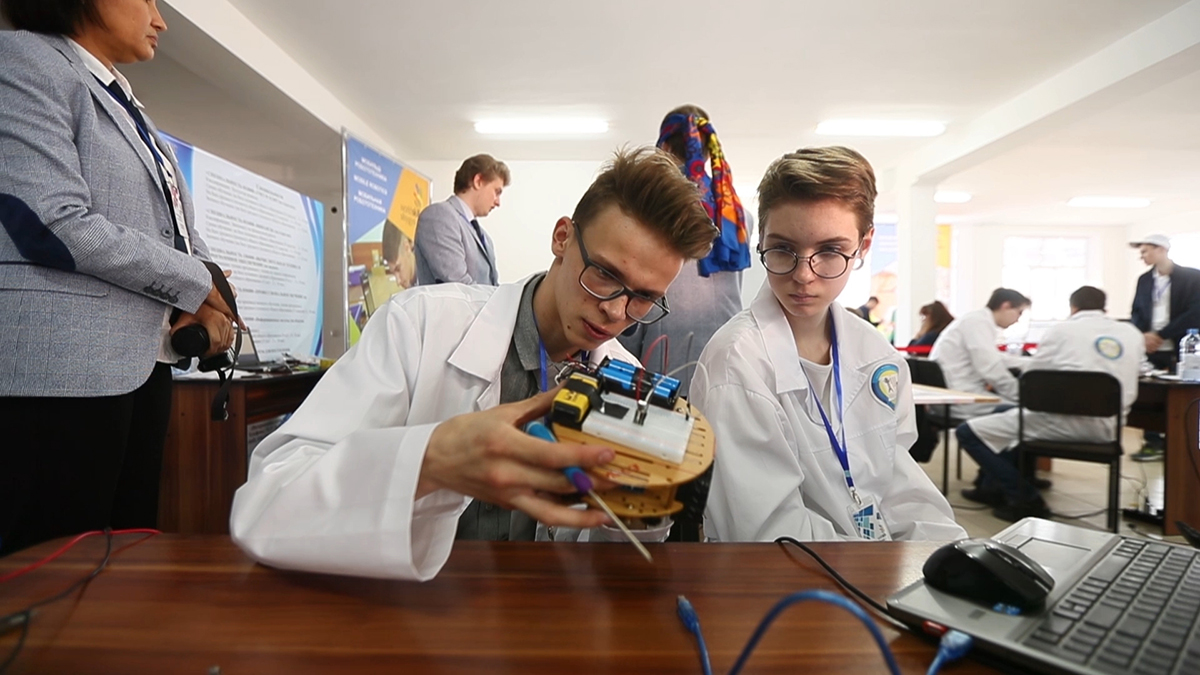
Since 2016, the Leading Schools - Partner Schools project has been implemented, within the framework of which assistance and support is provided to schools in the implementation of updated educational curricula. Today, 115 leading schools operate in the region in all cities and districts of the region, which carry out "patronage" over the attached 531 partner schools.
An indicator of effective work was the fact that for 3 years in a row in the traditional annual competition "The best organization of education" the first place and a prize fund of 34 million tenge are received by rural schools. With these funds, new equipment is purchased, the library fund is replenished, furniture is renewed, and the best teachers are awarded.
To create attractive conditions, incl. young specialists within the framework of the program "With a diploma in the village" for the purchase of housing were allocated 684.9 million tenge for 227 teachers. Lifting allowances were paid to 284 teachers for a total of 77.4 million tenge.
In the light of the implementation of the President's Address, a regional Roadmap was developed and approved for the implementation of a system for identifying gifted children living in rural areas, as well as from low-income and large families.
In the 2019-2020 academic year, 141,285 schoolchildren of the region took part in intellectual Olympiads, competitions and scientific competitions, of which 85,611 were schoolchildren from rural areas (61%).
Since December 2019, the region has been implementing the project of the Fund of the First President of the Republic of Kazakhstan to identify and develop young talents and leaders "El Umiti».
The National Intellectual Olympiad "Myń bala" is held annually to identify 1,000 of the most talented students from rural areas throughout the country, in order to give them the opportunity to study in the best schools in the country.
In the first stage of the national Olympiad, 15,729 schoolchildren of 5-6 grades of rural schools of the region took part, of which 300 schoolchildren were selected for the republican stage, of which 72 schoolchildren became winners. Two pupils of the 6th grade showed the highest result in the republic and were enrolled without competition in the republican physics and mathematics school (Almaty), 7 schoolchildren were enrolled in regional specialized schools for gifted children.
All activities for the development and support of gifted schoolchildren are held in close cooperation with regional universities, which provide a high level of scientific and methodological content of events, facilitate the organization of scientific consulting, as well as the selection and training of the Olympic reserve.
To date, the formed reserve includes 36 best students in various subjects.
In university laboratories, students have the opportunity to test the experimental part of their research. During the holidays, students regularly prepare for the republican stage of scientific competitions. Scientific consultation on projects is carried out by teachers of the leading universities of the region and the republic.
As a result of the measures taken, the team of gifted children of the region won 513 medals in intellectual competitions of the international and republican level over the past three years, including: 130 gold, 167 silver, 216 bronze medals. Of these: 132 medals at international competitions and 381 medals at events of the republican level.
In 2020, despite the quarantine measures, gifted schoolchildren of the region, as part of the National Team of the Republic of Kazakhstan, took part in international online Olympiads.
As a result, Rasul Magauin became the winner of the European Physical Olympiad, in which schoolchildren from 57 countries took part and brought the only gold to the Republic of Kazakhstan.
Temirlan Baibolov performed with dignity at the 32nd International Olympiad in Informatics and out of 4 participants representing the republic, he won a silver medal.
Almas Iskendirov won a bronze medal for Kazakhstan at the European Geography Olympiad.
A great achievement in 2020 was the 1st place of the regional schoolchildren's team, won at the republican military-patriotic training camp «Aibyn-2020".
Also, cooperation has been established within the framework of a memorandum between the Ministry of Education of the Republic of Tatarstan and the Education Department of the East Kazakhstan region.
Online round tables, webinars, online schools are held with the participation of teachers and schoolchildren of urban and rural schools. There is an exchange of experience in preparing students for Olympiads and competitions, start-up projects, methodological developments.
In December 2019, the regional team passed the absentee selection of the VI All-Russian Forum of High Technologies Kazanforum.doc. The 3 best projects presented by the students of the IT-lyceum in Ust-Kamenogorsk were invited to Kazan to participate in the final event among 30 projects. In total, 87 applicants from all over the Russian Federation took part in the selection. The projects of Ust-Kamenogorsk students presented in Kazan were highly appreciated by the international jury.
The network of organizations of additional education, incl. increased by 1 unit and consists of 114 organizations. The coverage of children in these organizations is 116,211 children.
Also, work is underway to expand the network and profile of circles and sections. Today, there are 2,723 circles in schools, incl. robotics, programming, video editing, media journalism, design.
Digitalization is becoming an integral element of the development of all spheres of society, including additional education. So in 2019, the innovation center Jastar Time was opened, where 170 schoolchildren are taught 2D / 3D graphics, programming, and video production. 7 university teachers were involved in their training.
In 2020, Zerek Center for Creative Education was opened, which made it possible to develop new directions, such as: IT-design in various fields, a studio of design skills and School of Business.
Children from large and low-income families attend the circles free of charge.
The well-being and safety of children remains a priority.
Since 2019, the non-governmental sector has been actively involved in the work on the prevention of crime and suicide among minors. 15 million tenge was allocated for the implementation of two regional projects "School mediation" and "Our children are our future’’. The projects were implemented by the Public Association "Mediation and Law «Alternative’' and the Public Association ‘’Fund for Information Support to Society «.
In order to prevent conflict situations and offenses among students of the Public Association "Mediation and Law" Alternative ", the project" School Mediation Service "has been developed.
The goal of the project is to train parents and students in mediation technologies in resolving conflicts that arise and to create a school mediation service in educational institutions of the region.
The service consists of high school students, college students, educators and parents. The service is coordinated by a professional mediator.
To implement the project, on Feb. 1, 2019, a memorandum of mutual cooperation was signed between the Education Department, the East Kazakhstan Regional Court and the NGO Mediation and Law Alternative.
The work carried out resulted in a 33% decrease in the number of completed suicides. Also, the number of juvenile delinquency has decreased by 12%.
On behalf of the President, special attention is paid to children with special educational needs.
At the beginning of the 2020-2021 academic year, 15,939 children with special educational needs live in the region.
In order to create conditions for the education of children of this category in general education schools, the Program for the Development of Inclusive Education for 2018-2020 is being implemented.
The program includes 4 initiatives. For its implementation, in general, 530.4 million tenge was allocated from the regional budget for 3 years.
As part of the program, 1,600 teachers and preschool educators completed coursework. The buildings of 38 schools and 5 organizations of additional education were adapted for the needs of children with musculoskeletal disorders, which made it possible for children with disabilities to attend circles and sections on an equal basis with others.
68 inclusion support rooms were equipped, incl. 2 offices within the framework of the republican initiative Kamkorlyk.
The issue of the need to open offices for psychological and pedagogical correction in four regions - in the city of Semey, Shemonaikhin, Tarbagatai and Ayaguz districts has been resolved.
In addition to budgetary funds for the implementation of the program, 70 million tenge of extra-budgetary funds were attracted from such funds as Dara, Bolashak, NIET WUMEN.
As a result of the implementation of the program in all schools where children with special educational needs study, special conditions for inclusive education have been created.
Social support of the population remains the top priority of state policy. All 48 thousand children from low-income and large families were provided with school uniforms and shoes. Parents of 3,764 children are exempted from paying in preschool institutions.
Today in the region in 2,922 sports sections there are 127,691 children, which is 66%. 646 educational institutions have 755 sports grounds, 568 football fields, 4 swimming pools and 279 schools have ski lodges for children to play sports. The provision of educational organizations of the region with sports equipment is 75.6%. All sports sections in educational institutions for schoolchildren of the region work free of charge.
Schoolchildren of the region take an active part in competitions in skiing, athletics, volleyball, basketball, football, hockey, arm wrestling, wrestling.
For example, the regional volleyball team took the second place in the team event at the VII international school sports festival among the CIS countries in Kazan.
In general, young athletes of the region at sports international and republican competitions in the 2019-2020 academic year won 34 medals in the team competition. Of these, 6 are gold, 11 are silver and 17 are bronze.
Organization and provision of good rest, health improvement, employment of children and adolescents in the summer is one of the priority tasks of the state social policy of the Republic of Kazakhstan.
In the 2019-2020 academic year in the region, the contingent of students in grades 1-10 was 176,578 people.
In 2020, it was planned to cover 160,165 or 99.8% of schoolchildren in 990 children's camps with summer recreation and health improvement.
Akims of districts and cities of the region have taken the necessary measures to organize recreation for children in the summer.
Current repairs were carried out in all 35 out-of-town camps, work was carried out to provide disinfectants for the entire period of operation of the camps.
Also, all children from large and low-income families (48,244) were planned to be covered with health improvement and recreation in summer country and school camps of various levels.
The Education Department of the East Kazakhstan region plans to train teachers in distance education.
From 20-24 July 2020, 64 experienced teachers as trainers will take an online course on “Methods and Means of Distance Learning” (36 hours). These trainers can train their peers prior to the start of the school year.
From July 27 to Aug. 31, 2020, more than 1,000 teachers of secondary schools of the region will take courses on this topic.
An algorithm has been developed for conducting 40-hour asynchronous online courses by the Center for Pedagogical Excellence "Teaching Distance Learning" on a free platform for 20,389 teachers of the region.
An algorithm has been developed for conducting 40-hour asynchronous online courses by the Center for Pedagogical Excellence "Teaching Distance Learning" on a free platform for 20 389 teachers of the region. In this course, teachers and methodologists of basic disciplines are trained first, then psychologists, speech therapists and other pedagogical workers. In the East Kazakhstan region, from Aug. 24 to 29, 2020, training is carried out on the basis of the training schedule.
Also, the Center for Pedagogical Excellence prepared a program of online courses "happy parent - successful child" for parents in order to improve the interaction between school and parents and reduce stressful situations for parents and students during distance learning. Courses will take place asynchronously on a free platform before and during the school year, where parents and students will be taught.
The regional center "Shygys" of the Education Department of the East Kazakhstan region continues to disseminate best practices in the use of distance learning technologies: the bank of methodological recommendations is being replenished (the experience of more than 2000 teachers has been studied, the best methodological recommendations are posted on the portal of the Department of Education of the East Kazakhstan region).
In addition, active educators take part in international forums and conferences, where they exchange the best ideas and experiences in distance learning technologies. In the summer, the International Forum "Subject-Methodological Space: Time to Restart", the International Scientific and Practical Conference "Research in Activity and in the Lessons: Implementation of Experience in Educational Organizations" were organized.
Before the start of the academic year, the Expert Council of "Shygys" will consider copyright materials of more than 3,000 teachers on the experience of introducing distance learning technologies. The best copyrighted materials will be included in the collection "The introduction of distance technologies in educational institutions" and will be posted on the educational portal of the Education Department of the East Kazakhstan region.
Development of healthcare system
According to the CVI treatment protocol, the equipment with resuscitation beds is 51.4% (319 beds). The minimum standard for equipping healthcare organizations with medical devices by order of the Minister of Health of the Republic of Kazakhstan is 93.3%.
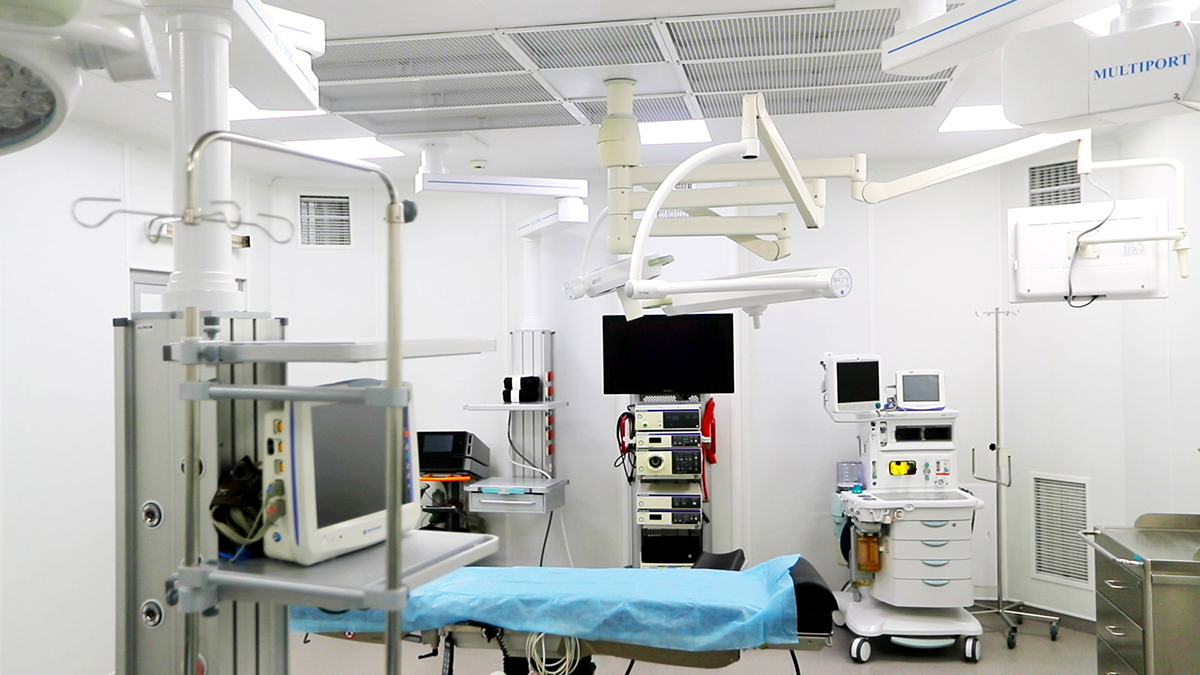
Medical organizations of the region are provided with:
For the development of transport medicine, 6 more mobile medical complexes were purchased, which provides each district / city.
Based on the results of the analysis, the equipment was distributed as follows:
In medical organizations of the region:
Epidemiological situation on CVI in the territory of the East Kazakhstan region dated Feb. 03, 2021:
a total of 20,470 cases of CVI were registered in the region, including 13,981 cases with clinical symptoms (68%), 6,489 cases of asymptomatic form (32%). The incidence rate per 100 thousand population was 1,498.7 (republican indicator - 1,023.7);
The percentage of the bed capacity (infectious diseases and provisional hospital) is 5.0%. The average value of the reproductive number in the region was 1.283 (republican indicator - 0.955).
The number of total infectious beds - 3,544, hospitalized - 189 (5.3%) and quarantine beds - 490, hospitalized - 14 (2.9%).
In connection with his recovery, he was discharged from the infectious diseases hospital, incl. 11,017 with covid pneumonia, home quarantine of 6,223 asymptomatic virus carriers has been completed. The total number of recovered patients is 17,240 patients.
Organization of mobile universal teams at PHC organizations to provide the population with a range of medical services at home, in medical and social institutions (LSU), incl. supply of medicines.
To strengthen the work of ambulance in primary health care organizations (hereinafter - PHC), 421 mobile teams (135 in cities, 286 in districts) have been organized to provide medical care to patients with signs of respiratory diseases that do not exclude COVID-19, which is 1 brigade for 3,323 people.
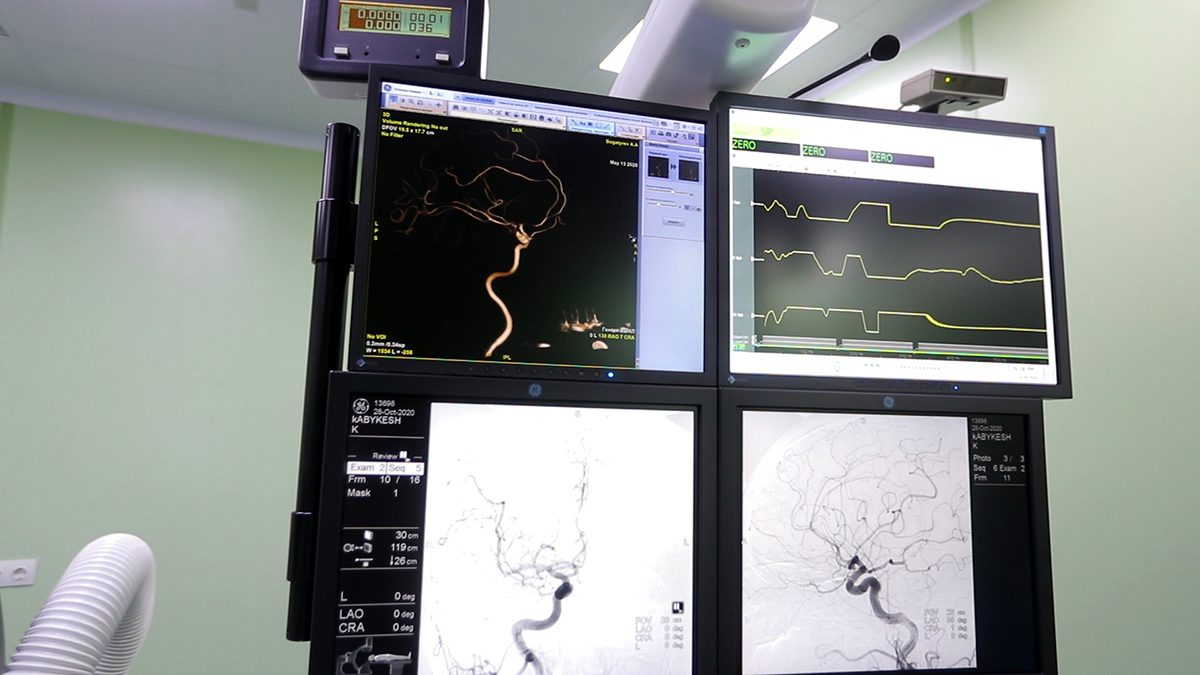
Disposable masks - 4,744,095 pcs., Disposable suits - 221,069 pcs., Reusable suits - 30,007 pcs., Respirators No. 95 - 611,046 pcs., Disposable gloves - 965,116 pcs., Seams - 27,285 pcs., Glasses - 5,160,904 pcs.
Measures in relation to persons who have arrived on the territory of the Republic of Kazakhstan from road trips are carried out in accordance with the decree of the Chief State Sanitary Doctor No. 59 dated Oct. 23, 2020 "On further strengthening measures for the prevention of coronavirus infection at checkpoints on the state border of the Republic of Kazakhstan" ( and with its changes - 64, 65).
Sanitary and quarantine control is carried out:
Since the beginning of the year, 6,841 people have crossed the border, of which citizens of the Republic of Kazakhstan - 4,427, foreigners - 2,414.transport units - 3,958, pedestrians - 1,849.
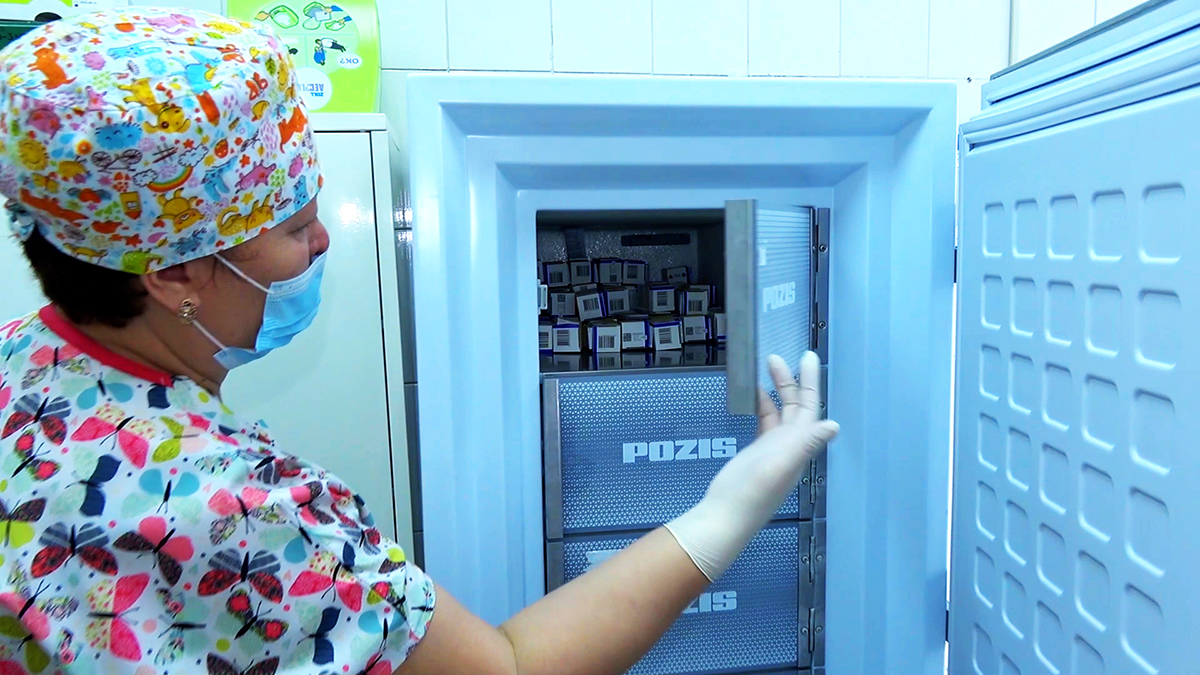
Over the past day, 334 people have crossed the border, of which citizens of the Republic of Kazakhstan - 231, foreigners - 103, transport units - 231, pedestrians - 59.
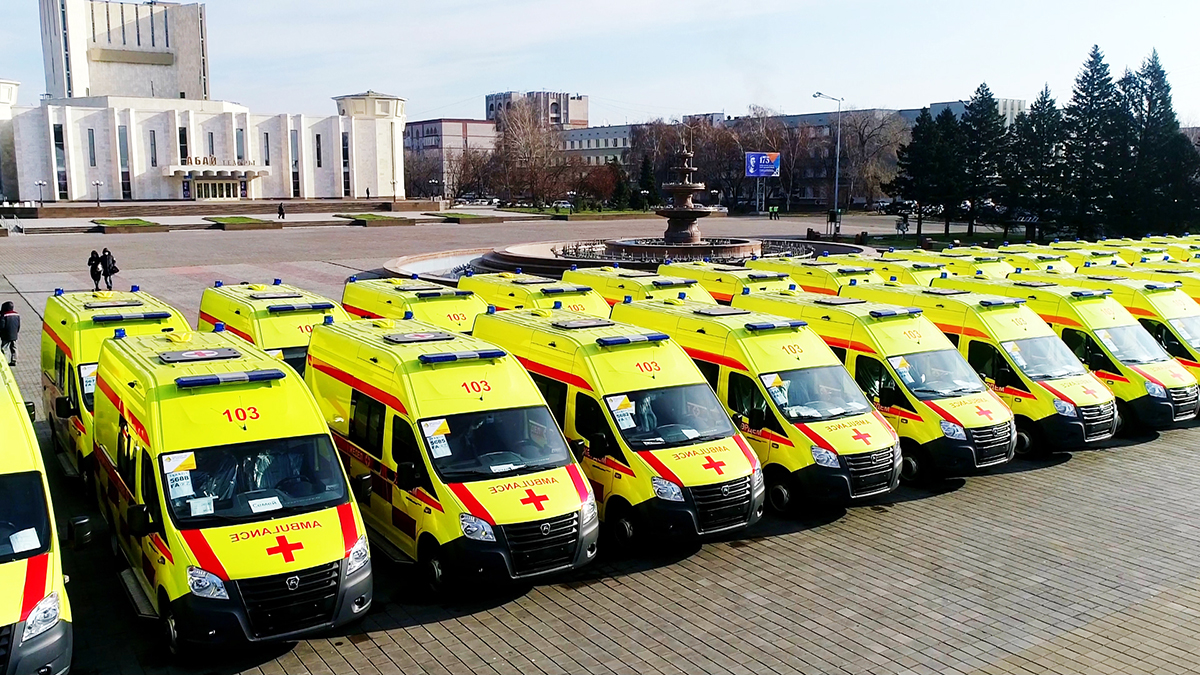
At road crossings, thermometry is carried out, questioning of people crossing the border, and control of whether they have a certificate with the results of a PCR study for coronavirus infection with a validity period of 72 hours (hereinafter - the certificate):
Number of foreign citizens, 66 people who do not have certificates with them, of which 1 person in the last 24 hours. All are not allowed to enter (return) to the territory of the Republic of Kazakhstan.
The number of citizens of the Republic of Kazakhstan who crossed the border and have a certificate with the results of PCR analysis (including a residence permit in the Republic of Kazakhstan for persons equated to them) is 3,429 people, incl. over the last day - 112 people.
Citizens of the Republic of Kazakhstan who crossed the border and do not have a certificate with the results of the PCR analysis (including persons equated to them who have a residence permit in the Republic of Kazakhstan), 223 people were registered, of which 5 people in the last day, these persons sent to a quarantine hospital for 3 days for examination and obtaining results for coronavirus infection.
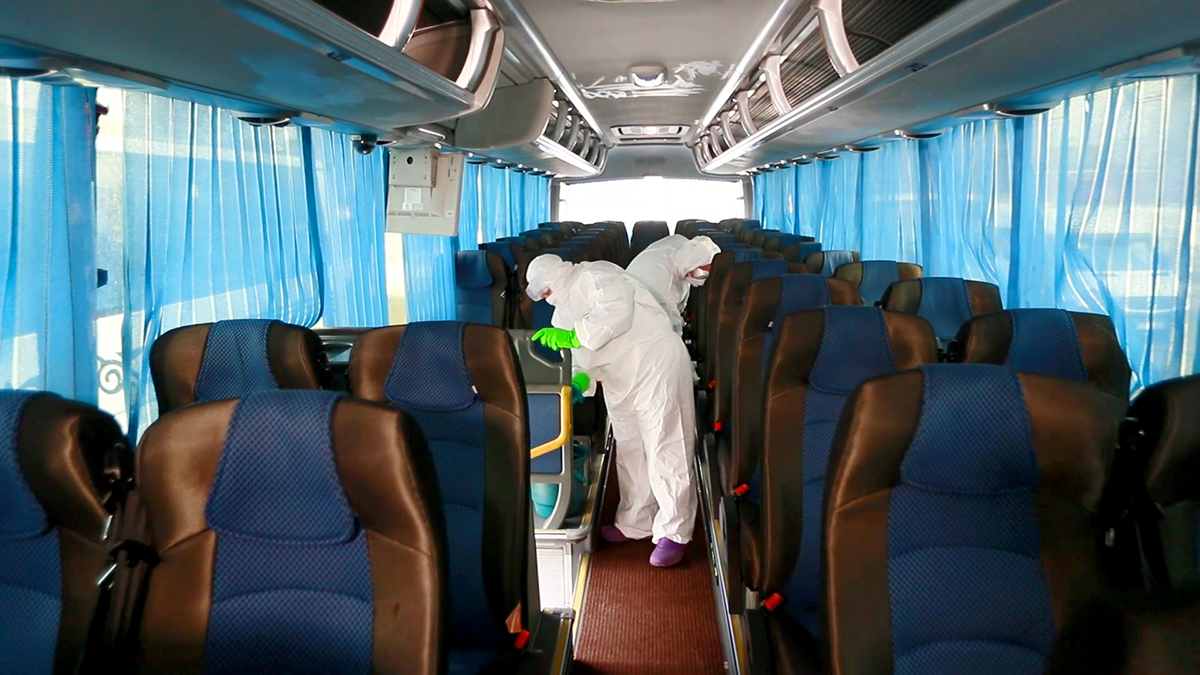
Crossed the border:
- transit drivers / transit passengers - 201/0, incl. for the last day - 15/0;
- the number of drivers carrying out transportation in a bilateral manner - 2 988 people, incl. over the last day - 202 people.
- 1 677 of them were examined.
Modernization of social infrastructure
The program "Modernization of Housing and Utilities" has been carried out since 2011, in the period 2011-2015. 2,451.3 million tenge was allocated from the republican budget.
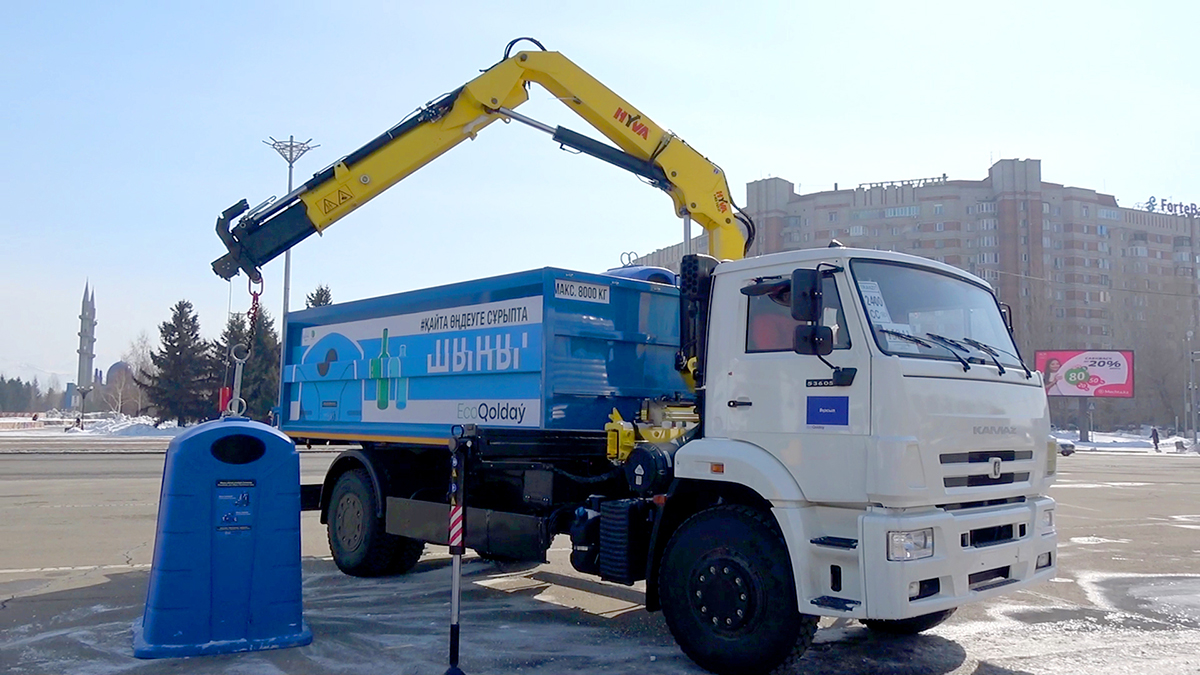
For 2011-2019 due to transfers from the republican budget and repayable funds, overhaul of 317 Moscow Railways was carried out for a total amount of 2,989.3 million tenge, incl. due to transfers from the republican budget, 268 Moscow Railways were covered in the amount of 2,451.3 million tenge, 49 Moscow Railways were repaired for the amount of 538.0 million tenge at the expense of repayable funds.
2015-2020 funds from the republican, regional budgets for the repair work, for the development of design and estimate documentation were not allocated.
Since January 2020, the continuation of the state program has been approved by the Decree of the Government of the Republic of Kazakhstan No. 1054 on Dec. 31, 2019 as part of the Nurly Zher state program of housing and communal development for 2020-2025.
In 2020, at the expense of repayable funds, work was carried out to repair 13 condominium objects (Ust-Kamenogorsk) with a total cost of repair work in the amount of 239.6 million tenge.
Thus, during the period of this program, 330 apartment buildings were repaired for a total amount of 3,228.9 million tenge.
Stay updated about the events of the Prime minister and the Government of Kazakhstan - subscribe to the official Telegram channel
Subscribe